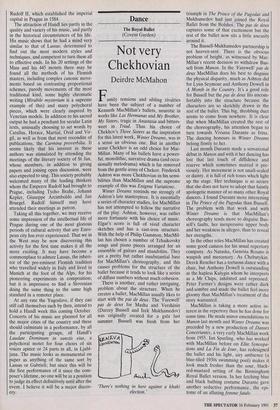Dance
The Royal Ballet (Covent Garden)
Not very Chekhovian
Deirdre McMahon
Family tensions and sibling rivalries have been the subject of a number of Kenneth MacMillan's ballets, neurotic in works like Las Hermanas and My Brother, My Sisters, tragic in Anastasia and bitters- weet in Triad. Thus his choice of Chekhov's Three Sisters as the inspiration for this latest work, Winter Dreams, was in a sense an obvious one. But in another sense Chekhov is an odd choice for Mac- Millan. Many of his ballets have a power- ful, monolithic, narrative drama (and occa- sionally melodrama) which is far removed from the gentle irony of Chekov. Frederick Ashton was more Chekhovian in his sensi- bilities than MacMillan and the supreme example of this was Enigma Variations.
Winter Dreams reminds me strongly of Ashton's late masterpiece. It is essentially a series of character studies, for MacMillan has not attempted to follow the narrative of the play. Ashton, however, was rather more fortunate with his choice of music. Elgar's score is full of vivid character sketches and has a cast-iron structure. With the help of Philip Gammon, MacMil- lan has chosen a number of Tchaikovsky songs and piano pieces arranged for an ensemble of guitars and niandolins. They are a pretty but rather insubstantial base for MacMillan's choreography, and this causes problems for the structure of the ballet because it tends to look like a series of diffuse numbers without much cohesion.
There is another, and rather intriguing, problem about the structure. When he creates a ballet, MacMillan usually likes to start with the pas de deux. The 'Farewell' pas de deux for Masha and Vershinin (Darcey Busse11 and Irek Mukhainedov) was originally created for a gala last summer. Bussell was fresh from her 'There's nothing in here against a khaki election.' triumph in The Prince of the Pagodas and Mukhamedov had just joined the Royal Ballet from the Bolshoi. The pas de deux captures some of that excitement but the rest of the ballet now sits a little uneasily around it.
The Bussell-Mukhamedov partnership is not heaven-sent. There is the obvious problem of height, as witnessed by Mac- Millan's recent decision to withdraw Bus- sell from Manon. In the 'Farewell' pas de deux MacMillan does his best to disguise the physical disparity, much as Ashton did for Lynn Seymour and Anthony Dowell in A Month in the Country. It's a good role for Bussell but the pas de deux fits uncom- fortably into the structure because the characters are so sketchily drawn in the rest of the ballet. This big, throbbing duet seems to come from nowhere. It is clear that when MacMillan created the rest of the choreography, his attention began to turn towards Viviana Durante as Irina. The dancing honours in Winter Dreams belong firmly to her.
Last month Durante made a sensational debut in Manon and with it her dancing has lost that last touch of diffidence and reserve which sometimes marred it pre- viously. Her movement is not small-scaled or dainty, it is full of rich tones which light up the stage. Her technique is so secure that she does not have to adopt that faintly apologetic manner of so many other Royal dancers. I found Durante more interesting in The Prince of the Pagodas than Bussell. The problem with that work and with Winter Dreams is that MacMillan's choreography tends more to disguise Bus- sell's faults, her inexpressive upper body and her weakness in allegro, than to reveal her strengths.
In the other roles MacMillan has created some good cameos for his usual repertory company. As Natasha, Genesia Rosato is waspish and mercenary. As Chebutykin. Derek Reacher has a tortuous dance with a chair, but Anthony Dowell is outstanding as the hapless Kulygin whom he interprets as a Mr Chips, inhibited and repressed. Peter Farmer's designs were rather dark and sombre and made the ballet feel more gloomy than MacMillan's treatment of the story warranted.
MacMillan is taking a more active in- terest in the repertory than he has done for some time. He made minor emendations to Manon last month and Winter Dreams was preceded by a new production of Danses Concertantes, a very early MacMillan work from 1955. Ian Spurling, who has worked with MacMillan before on Elite Syncopa- tions and La Fin de Jour, has redesigned the ballet and his light, airy ambience (a blue-tiled 1930s swimming pool) makes it look much fresher than the sour, black- red-mustard setting of the Birmingham Royal Ballet version. In her fetching blue and black bathing costume Durante gave another seductive performance, the epi- tome of an alluring femme fatale.


















































 Previous page
Previous page